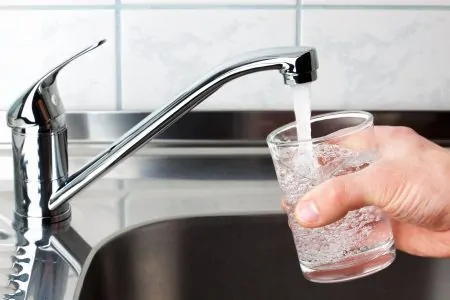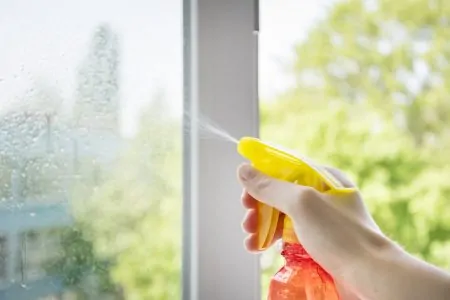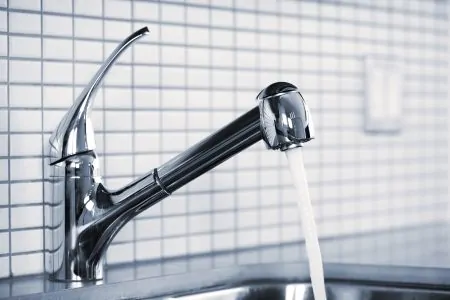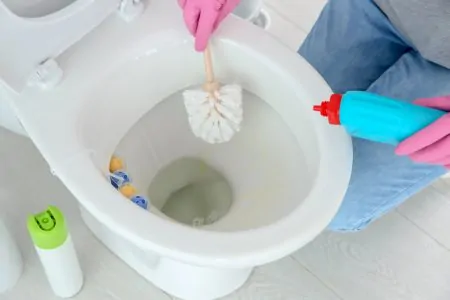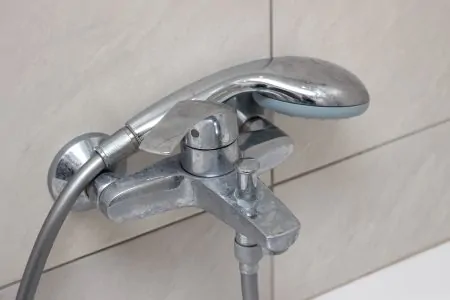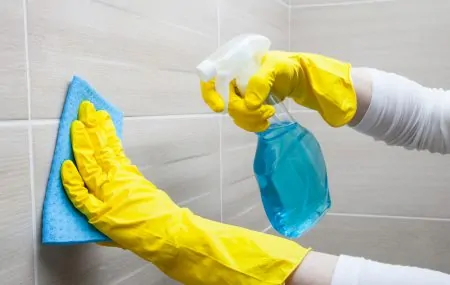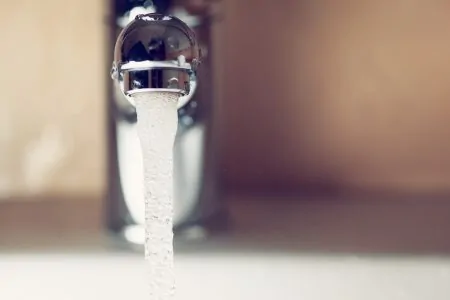Hard water leaves limescale and damages plumbing, but does it also have a negative impact on the human body? Soft water is purer but does that necessarily mean it is better for your health?
The debate of hard vs soft water has been ongoing for years, and both water types have positives and negatives. If you’re trying to decide whether to soften your water or retain its mineral content, it is important to consider how hard it is and what you will use it for.
To help you make a decision, this article will explore hard and soft water, examining the benefits and drawbacks of each type. We will also explain how to test your water to determine its hardness, so you will know where you stand.
Key Takeaways
- Hard water has high mineral content, providing health benefits like extra calcium and magnesium, but can cause limescale and damage to plumbing and appliances.
- Soft water is low in mineral content, gentler on skin and hair, and better for appliances, but may not be as healthy to drink due to higher sodium levels.
- Both hard and soft water have advantages and disadvantages, so it is important to consider your needs and decide which type of water is best for you.
- To determine your water hardness, you can use tests like the shower or tub test, bottle test, or purchase a water test kit or wet strips.
What is Hard Water?
Hard water has a high mineral content caused by flowing past chalk and limestone deposits. These deposits are mostly composed of calcium and magnesium carbonates. When water flows through or over these deposits, it collects the minerals and becomes “hard” (1).
The word “hard” can sound concerning and you might think it is unsuitable to drink. In reality, hard water has health benefits, as it is a source of extra calcium and magnesium, both of which are required for the body to function properly (2).
However, hard water is less beneficial for your home, particularly your plumbing. When hard water evaporates, it leaves its mineral content behind, creating limescale deposits that can clog faucets, showerheads, and appliances.
In industrial use, hard water can damage machinery and inhibit tasks that use water by creating buildups and blockages. When the pipes become restricted or blocked, it can prevent proper lubrication, leading to moving parts overheating and being unable to function. In these settings, water hardness is monitored constantly using strip tests and digital devices.
Advantages of Hard Water
- Health benefits: The main advantage of hard water is the positive influence it can have on your physical health. The high mineral content means it is much better for people with cardiovascular disease, compared to softened water which contains more sodium (3). It’s also beneficial for bones and teeth as it provides the body with calcium.
- Reduces lead contamination: Although hard water is generally harmful to plumbing, it can actually reduce the risk of lead contamination. In areas with hard water, minerals often accumulate on the inside of pipes. This extra layer prevents the water from coming into contact with lead in the pipes, preventing it from being contaminated. This isn’t to say that hard water won’t contain any lead, but the risk of contamination can be reduced (4).
Disadvantages of Hard Water
- Mineral buildup: This is a major negative for appliances and plumbing, and the reason that many people want to avoid hard water. When hard water comes into contact with appliances and plumbing, it leaves a part of its mineral content behind, which then solidifies into limescale. This narrows pipes or clogs them entirely, preventing your plumbing from working properly.
- Skin and hair: Hard water also affects the skin and dries out hair, making it brittle and more prone to breaking. This can be avoided by installing a shower water filter, which will protect your skin and hair while you still benefit from the mineral content elsewhere in your home.
What is Soft Water?
Soft water has a low concentration of ions, particularly calcium and magnesium. It can be created by treating hard water, but it is also available naturally; rain is always soft before it touches the ground (5).
In places with very solid rocks or those that lack calcium, the water won’t collect as much of the mineral — resulting in soft H2O. As soft water is low in calcium ions, it won’t cause soap scum, limescale, or other mineral buildups.
People sometimes use the terms soft and softened water interchangeably. Soft water is natural, whereas softened water has undergone a process that removes its mineral content. Softened water can be high in sodium and bicarbonate ions, depending on how it’s treated, which might leave it tasting slightly salty (6).
The mineral content required to classify water as soft or hard varies depending on the state or country. Generally, in the United States, water must have less than 1 GPG (grain per gallon) of dissolved minerals to qualify as “soft” (7).
Advantages of Soft Water
- Softer laundry: Soft water is better to clean laundry with as it won’t dull colors or leave spots or marks. It will also make it feel softer as there will be no dried minerals left on the material.
- Better for appliances: Soft water is far safer for your plumbing appliances, including dishwashers, washing machines, and water heaters. As hard water accumulates in pipes and narrows them, appliances are forced to work harder, thus raising your energy bills. In contrast, soft water allows them to operate at optimal levels.
- Skin and hair: Washing yourself with soft water preserves the moisture in your skin and hair. It will also keep your hair from becoming brittle and breaking more easily, which is often a side effect of hard water (8).
Disadvantages of Soft Water
- Health concerns: However, soft water isn’t as good for people as it is for appliances. If you soften your water, sodium is added as minerals are removed. This increases the salt content of the water, which can be unhealthy, especially if you are on a low-sodium diet due to a cardiovascular issue (9).
- Doesn’t combat lead: Softened water is also more volatile due to the softening process. It absorbs contaminants such as lead more easily. Lead is a common issue across the United States, particularly in older homes. It is a heavy, dense metal that was commonly used to manufacture water pipes. It also has a low melting point, which means it enters drinking water that flows through lead pipes (10).
Differences Between Soft and Hard Water
You might not notice a difference in how soft and hard water taste unless you are paying close attention, but there are some important differences between the two types. Both hard water and soft water have advantages and disadvantages:
Mineral Content
The main thing that distinguishes hard water from soft water is their respective mineral contents. Rainwater is soft as it falls from the sky, but this changes quickly as it flows across and under the ground and into our waterways.
How much it changes depends on the minerals it encounters. Areas that are rich in calcium and minerals will have hard water, but locations with little calcium will usually have soft water.
The most common minerals found in hard water include lime, chalk, calcium, and magnesium. These minerals, particularly magnesium, are important for our overall health (11).
Despite sounding healthier, soft water doesn’t provide the same health benefits as hard water. In fact, the lack of minerals and higher sodium levels mean it is not recommended for people with cardiovascular issues (12).
Drinkability
Unless you have a specific health issue, it is perfectly safe to drink hard and soft water. However, hard water is usually the healthier option due to its higher mineral content (13).
Many people also prefer the taste of hard water over soft — its mineral content gives it a richer, more satisfying taste (14). Soft water often has a salty taste because it contains more sodium.
Household
Although hard water is the healthier option to drink, it has the opposite effect on household plumbing and appliances.
The high mineral content can quickly cause limescale and mineral buildup in faucets and showerheads. Water heaters can become clogged due to these deposits, and they require frequent flushing to get rid of calcium in very hard water areas (15).
Hard water also makes it more difficult to clean various objects and surfaces around your home. It leaves watermarks and spots on glasses and windows and makes otherwise clean laundry look dull.
Soft water is far kinder to plumbing appliances and won’t create any deposits due to its lack of minerals. It is easier to clean with as soap suds form more easily (16). Homes with hard water often need to have a softener installed to prevent water spots and buildups in appliances.
Skin Care and Health
Hard water is unkind to the skin and can leave it dry and rough. The high mineral content might also damage your hair, making it dry, dull, and brittle, which leads to it breaking more easily.
This issue can be worsened by using certain shampoos and hair products. The minerals can also leave a residue on the hair, similar to limescale, and might cause discoloration (17).
Soft water is gentle on skin and hair. It helps to preserve moisture and prevent breaking. If your hair has been colored, soft water will help maintain the color for longer than hard water.
Testing Water Hardness
It is easier than ever to find out whether or not your water is hard, with various testing kits of different types widely available. If you want to check your water without spending money on a testing kit, there are other ways to find out.
1. Shower or Tub Test
This is one of the quickest and easiest ways to tell whether your water is hard or soft. After taking a shower or bath, you might notice a white scale on the surfaces of the tub or shower tray. This scale is left by hard water and is the water’s mineral content.
If you see these deposits, it is a possible sign that you have hard water with very high mineral content. In time, this water could damage your fixtures and appliances, clogging pipes and preventing your plumbing from working as it should.
We recommend finding a way to soften the water to prevent any damage to your system. This can be achieved using different methods, the most common and effective of which is an ion exchange system. These softeners replace calcium and magnesium ions with salt ions, thus reducing the water’s hardness (18).
2. Bottle Test
To try this test, you need a plastic bottle with a lid and some dish soap.
- Fill a bottle: Fill the bottle halfway with water and add five squirts of dish soap.
- Shake: Fasten the lid and shake the bottle vigorously until it begins to foam.
- Inspect: After shaking the bottle, watch the foam. If the foam lasts for a while, it means your water is soft. However, if it disappears quickly, your water is likely hard.
3. Test Kits
If you want a definitive answer as to whether your water is soft or hard, or you want to know how hard it is specifically, you have two options:
- Water test kit
- Wet strips
Water Test
With a water test kit, you can get an accurate measurement of your water’s mineral content. They are easy to use and the kit will contain everything you need to conduct the test.
Start by filling one vial with water, add the required amount of solution and then shake it for however long is specified. Compare the results to the chart included with your kit.
Wet Strips
Another type of test kit contains wet strips. These are even simpler — you simply dip the strip in a glass of tap water. Depending on the mineral content of the water, the strip will change color, and you can then compare that color to an included chart.
FAQs
The Results
In the battle of hard vs soft water, there is no clear overall winner. Both types of water have advantages and disadvantages, depending on why you need them.
Hard water has a high content of minerals such as calcium and magnesium. This makes it healthy to drink and means it will strengthen your teeth and bones. However, it can have an adverse effect on your skin and hair, drying them out and making hair more prone to breaking. It also causes limescale in plumbing and appliances.
Soft water is much kinder to our skin, hair, and plumbing because it lacks minerals. However, it is also high in sodium, which means it shouldn’t be your sole source of drinking water. This also means it is not recommended for people with cardiovascular issues or anyone else on a low-sodium diet.
If you want to enjoy the benefits of both hard and soft water in your home, consider installing dedicated filters on certain outlets. For example, a shower filter will protect your hair and skin but means you can still drink hard water from your kitchen faucet. This gives you the best of both worlds.
